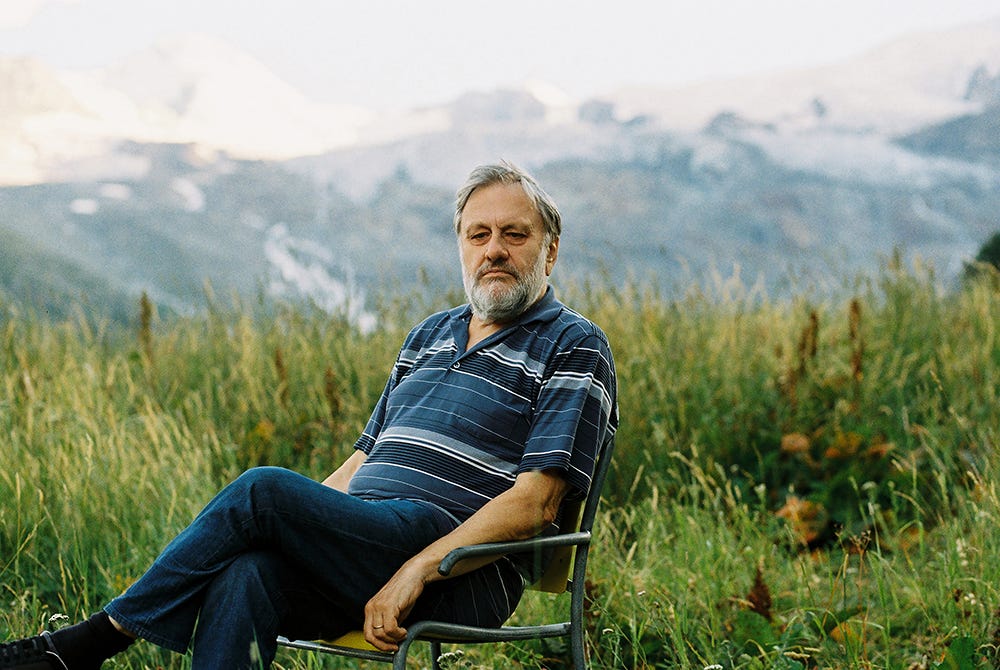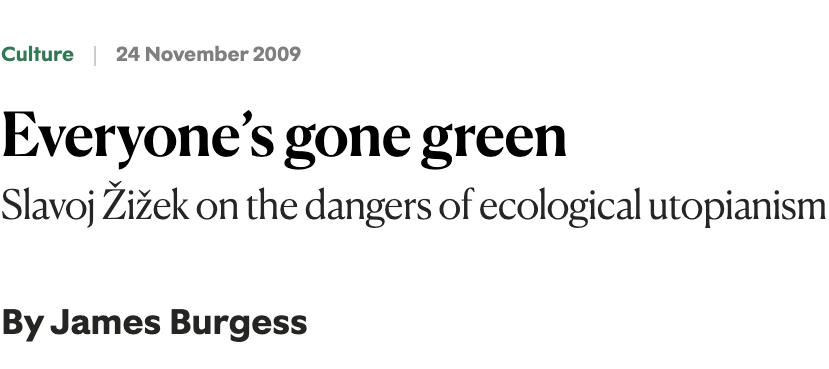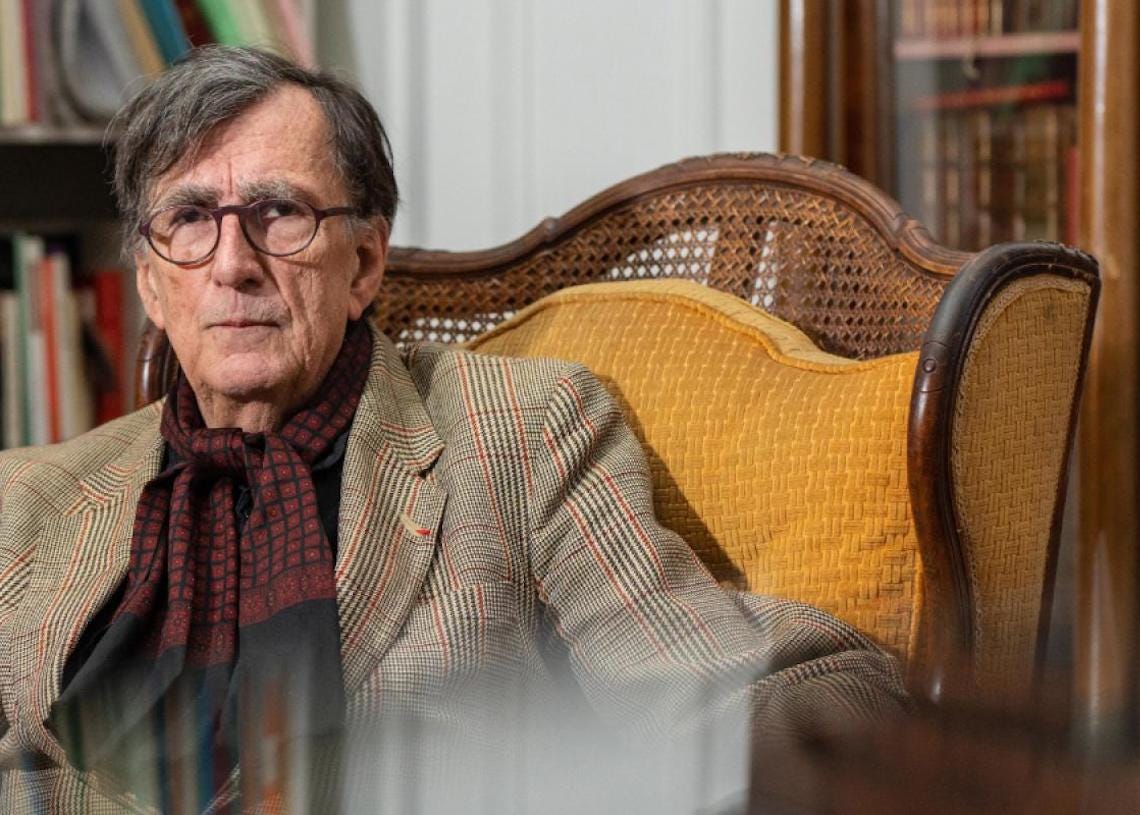Žižek Synergies with other thinkers
Against the social apocalypse
Slavoj Žižek takes a radically critical stance in many of his texts and lectures toward dominant discourses on contemporary art and climate change.
At the core of his thinking is the idea that climate change must not be seen merely as an ecological problem, but as a profound societal and metaphysical rupture—one that fundamentally calls into question our aesthetic practices and political strategies.
Key interlocutors and their positions reveal how Žižek builds synergies with other thinkers and what concrete courses of action arise from these connections.
Anti-naturalism and resistance to the “normalization” of climate change
In his lecture at the Institute of Contemporary Arts, Žižek warns against mystifying nature as a utopian state or accepting climate change as an inevitable new “normal.” He criticizes the concept of “sustainable development” as a double-edged cynicism.
On one hand, climate protection is instrumentalized as a business model; on the other, arbitrarily set “limits” serve as an alibi for business as usual. Instead of defining arbitrary climate targets, we must confront uncertainty and embrace political will.
We cannot know the precise outcome, but we are “condemned” to act as free agents and make radical decisions.
(Source: newstatesman.com)
Apocalypse as revelation rather than catastrophe
In his Wired essay “Apocalypse as Revelation”, Žižek argues that “apocalypse” should not be reduced to catastrophe rhetoric, but rather seen as a moment of radical self-reflection.
He rejects ecological return ideologies (“back to nature”) and warns against a naïve assignment of blame solely to humanity. Instead, we must acknowledge the contingency and fragility of all systems, while placing philosophy and science in a position of solidarity for understanding global risks.
(Source: wired.com)
The universal being and “war communism against extreme weather”
In an interview with Die Welt, Žižek advocates for a kind of “war communism” in the face of extreme weather events. He draws on Marx’s concept of the universal being:
“Only if we massively pool our forces and understand ourselves as fragments of a natural totality can we responsibly advance the regeneration of the Earth.”
A smaller, humbler human role is an illusion—we must instead use our systemic power to avert catastrophic developments.
(Source: welt.de)
Territorial politics and de-centering (Bruno Latour)
In conversation with Bruno Latour, Žižek develops a “decentered” politics that connects leftist social concerns with ecology. Latour emphasizes the need to ask about material conditions (climate, food systems, population).
For Žižek, this means that social justice and environmental policy must not be thought of separately. The synergy lies in connecting Žižek’s Hegelian dialectics with Latour’s “terrestrial politics”:
“We must address global conflicts and local vulnerabilities simultaneously.”
(Source: shs.cairn.info)
State intervention and the deconstruction of the market (Naomi Klein)
Žižek draws on Naomi Klein’s thesis that serious climate protection cannot be achieved through carbon markets or individual behavior changes but through radical regulation and massive investments in public infrastructure.
He supports her call to discard the “free-market playbook” and instead establish a form of “Green War Communism” that significantly curtails corporate power and sees the state as the architect of a sustainable transition.
(Source: commondreams.org)
Art and aesthetics must dramatize the rupture of “normality” and “growth” by focusing on apocalypse and contingency.
Politics requires a dual strategy: through global state intervention (Klein/Žižek) and a locally grounded, “terrestrial” practice (Latour).
Resistance to sustainable development as an alibi demands a new political freedom that embraces uncertainty and enables radical action.
Marx’s idea of the universal being can serve as an antidote to the trivialization of ecological risks by emphasizing collective responsibility.
De-normalizing climate change in art and politics helps maintain existential urgency and interrupt dynamics of exploitation.
We must connect public infrastructure initiatives (like the “Green New Deal”) with creative, decentralized formats that integrate social participation, ecological experimentation, and aesthetic provocation.
KB
Sources
Slavoj Žižek at the ICA on ecology, New Statesman, Nov 2009
https://www.newstatesman.com/culture/2009/11/381-382-climate-crisis-globalSlavoj Žižek: Apocalypse as Revelation, Wired, Aug 2010
https://www.wired.com/2010/08/zizek-apocalypse-as-revelationSlavoj Žižek: Kriegskommunismus gegen Extremwetter, WELT, Juni 2023
https://www.welt.de/kultur/plus232636263/Slavoj-Zizek-Kriegskommunismus-gegen-Extremwetter.htmlFor a terrestrial politics: An interview with Bruno Latour, Cairn.info, 2018
https://shs.cairn.info/journal-esprit-2018-1-page-145.htmNaomi Klein: If You Take Climate Change Seriously…, Common Dreams, Feb 2012
https://www.commondreams.org/news/2012/02/29/naomi-klein-if-you-take-climate-change-seriously-you-have-throw-out-free-market









